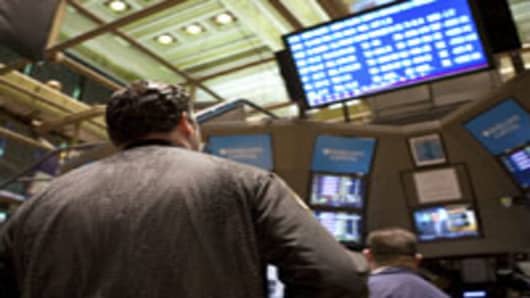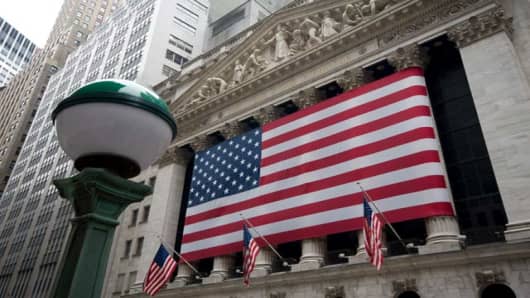Stocks may pedal sideways as investors shift focus to the wilting dollar and any data that might provide clues about the economy's recovery.
Despite ups and downs, stocks finished the past week basically flat, ahead of the long Memorial Day weekend. The Dow rose 0.1 percent to 8277, and the S&P 500 was up 0.5 percent to 887. The dollar, meanwhile, had its worst week since December and traded at its low for year.
The next two weeks offer plenty of economic data, starting with Tuesday's consumer confidence, and leading up to the June 5 employment report. In the week ahead, the big items are several housing reports. Investors will also pay attention to headlines around GM, as it heads to almost certain bankruptcy June 1.
There is another $101 billion in Treasury notes coming to auction in the coming week, and traders are watching tensions in the bond market, where long end rates rose sharply in the past week. The yield on the 10-year finished Friday at 3.446 percent, a sharp increase from 3.125 the week earlier.
"It's a 'show me' period, but the expectation is that the data is going to disappoint, as it mostly has for the last few weeks," said Binky Chadha, chief U.S. strategist at Deutsche Bank.
The dollar will be a key factor, said Art Cashin, director of floor operations at UBS. The green back was under pressure in the past week as investors moved to riskier assets, but it also took a hit on concerns the credit rating of the United States was at risk. That fear circulated after S&P said the U.K.'s outlook is negative. Both the U.K. and U.S. are piling on debt to tackle the financial crisis.
"Fears and worries can produce an avalanche of selling, and we have to watch that we don't see critical mass coming on the dollar," said Cashin. He said if the S&P 500 in the coming week moves below the 879 low made Thursday, a more protracted correction in stocks could follow.
The dollar was trading at $1.40 per euro Friday. "I find it a little bit illogical," said Boris Schlossberg , director of currency research at GFT Forex. "The U.S. is going to have massive budget issues going forward, but the European economy is hardly a bastion of strength..The higher the euro goes, the more problematic it becomes. The recovery story was anchored by the euro weakening story, which allowed European exports to become more competitive in the international market."
"The really big question is will the dollar be able to come back? It is going to be a a matter of economics for us. If we can show signs of recovery in (the second half), people are going to feel a lot more confident," he said. Schlossberg said the worry is that investors would boycott dollars if the economic news doesn't meet expectations, particularly when it comes to employment.
Econorama
Real estate data will be the headline grabber in the coming week, as existing home sales are reported Wednesday. The S&P/Case-Shiller home price index is reported Tuesday and new home sales for April are expected Thursday. Citigroup economists said they see a slight increase in both existing and new home sales as price cuts inspired some buying. They expect a 2.5 percent increase in existing home sales to 4.68 million.
Mark Zandi, chief economist at Moody's Economy.com expects the housing data to remain weak, but he is watching readings on the consumer for possible improvement.
"Interestingly, I think consumer confidence is the most important statistic. I don't look at it in normal times . It reflects conditions. It doesn't drive them. At turning points, it is the key variable. It always falls consistently three or four months before a recession begins, and it always turns decisively and consistently three or four months before a recovery begins," Zandi said. "If we get another jump in May, like we had in April, I would view that as a positive sign."
Consumer confidence is reported Tuesday and consumer sentiment is reported Friday. On Thursday weekly jobless claims and durable good are reported. Friday's data includes the final look at first quarter GDP and Chicago purchasing managers data.
Zandi is also focused on durable goods data. "Businesses actually are panicked, and they've slashed everything.. I don't expect a big turnaround but hopefully we get a more neutral kind of number and we would view that as a positive sign."
Zandi is also watching the stock market's behavior. "The economy has never recovered without the equity market leading the way," he said. "If we get another leg up in the stock market, that would be very definite that the recovery has taken hold.. It has impact on spending, confidence and the banking system. It's both a signal and it's a fundamentally important economic variable."
The problem, however, is that the market may have moved too far ahead of the data showing improvement. "I think the equity market has kind of priced in the idea that the recession is moderating, winding down. It's not going to move higher until there's clear evidence that the recovery is taking hold, and I don't think we're there yet. I think we're a number of months away from that," he said.
Whither Stocks
Deutsche Bank's Chadha also says it's likely stocks will not move ahead just now, and that the market is in a consolidation phase. However, the market will continue to see a positive bid as underweighted investors move in during dips. That phenomena should keep the market's trend going sideways.
"Basically, we were expecting some consolidation because the market had moved a little too far, too fast, which has become a cliché by now. I don't expect a big consolidation for the market as a whole," he said, in a phone interview. "I think we go sideways to consolidate until we have a clear picture that earnings are going to be better, and the earnings are going to be better," he said.
Chadha said there has been an important change in earnings in the past quarter. For one, more than 65 percent of companies in the S&P 500 had positive surprises.
"The bigger surprise really is the absolute increase in margins. Not that they are better than expected, but that they actually rose," said Chadha. "The question is is that increase sustainable given they rely on two things — operating leverage and fixed costs ... The view we are taking going forward is not only is there improvement in margins in the first quarter, we are likely to see margins improve from here, even with negative GDP growth."
Chadha said that S&P 500 EBITDA margins rose to 15.9 percent in the first quarter, up from 11.4 percent in the fourth quarter. He noted that much, but not all of the improvement came from financials. Margins for that group rose to 16.2 percent form 15.8 percent.
"The actual bottoming in earnings we see happening between the second and third quarter," he said. Another sign of improvement, he said, were the fewer than expected write offs in the first quarter.
Chadha also commented on the action in Treasurys and the dollar in the past week which bit into the stock market's gains in the past week.
"There is clearly some disconnect between equities, fixed income, and the dollar. We did expect the dollar to weaken as equity markets came back, as risk comes back. The moves we've seen in the last few days are a little bit over done," he said. "On Treasurys, I think they are pricing in too little of a recovery. Even if there was not supply issues, we should be a lot higher ( rates) given the kind of consensus recovery we are talking about."
Oil Drill
Oil, like other commodities, has benefited from the dollar's weakness. It finished the past week 8.2 percent higher at $61.67 per barrel. Traders are looking ahead to OPEC's meeting in Vienna Thursday.
Mike Fitzpatrick of M.F. Global does not expect OPEC to take any action. "They certainly don't want to be accused of pricking the illusory recovery, and I think if they try to engineer any more cuts, it would be very difficult to hold together the cuts they have right now," said Fitzpatrick.
Fitzpatrick said as commodities move up and the dollar weakens, concerns about inflation have picked up. Gold, viewed as an inflation hedge, finished the past week 3 percent higher at $958.50 an ounce, the highest level since Feb. 25.
Questions? Comments? marketinsider@cnbc.com




